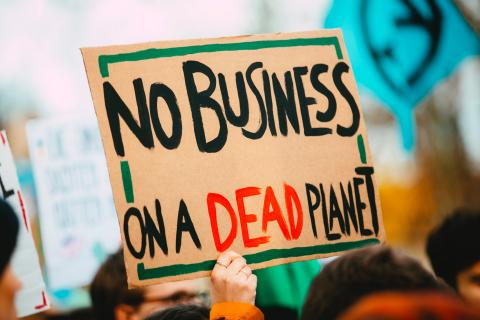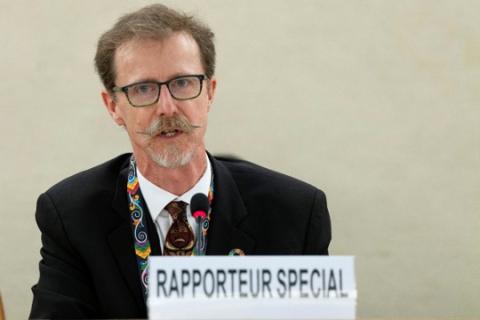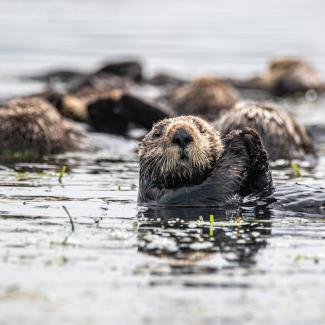Warrior Lawyer Profile: David R. Boyd

Shona Anne Thomas
Allard LLM Candidate
Jun 14, 2023
An Optimistic Environmentalist
This question posed by environmental lawyer David R. Boyd has the power to stop people in their tracks even if environmental issues were never a cause they cared for.
A few statistics drive home Boyd’s point. A Monash University study published in 2023 revealed that only 0.18% of the global land area and 0.001% of the global human population enjoy safe levels of fine particulate matter – the foremost factor in environmental health – as determined by the World Health Organization (WHO). Toxic per- and poly-fluoroalkyl substances (PFAS), also known as “forever chemicals,” have been found in rainwater, rivers and people’s bloodstreams all around the world. Natural systems vital for the sustenance of life have been altered so dramatically that all inhabitants’ ability to live a dignified life is threatened.

Human Right to a Healthy Environment
Framing the idea of a healthy environment as a right was intentional on Boyd’s part because the language of rights has such a long history of driving powerful transformations – take the abolitionists and suffragettes movement. In urging people to think of rights as an evolving subject that emerges in response to wrongs, he points to the fact that the Universal Declaration of Human Rights was the world’s response to the unimaginable degree of rights violations during World War II. Boyd explains in his 2017 book, The Rights of Nature: A Legal Revolution That Could Save The World, that our misuse of nature is rooted in three related ideas: that humans are separate from and superior to the rest of nature; that everything in nature is our property; and that limitless economic growth is the paramount objective of modern society.
Human rights are rights that are universal and essential to human dignity regardless of whether there are laws passed recognizing these rights. The problem is that they have to be enshrined in law to be enforceable. According to Boyd, 95 constitutions around the world already recognize the right to a healthy environment. However, more can be accomplished if the right to live in a healthy environment is recognized by all countries.
Boyd’s Journey as An Environmentalist

Dr Boyd is the United Nations (UN) Special Rapporteur on human rights and the environment, and is a leading Canadian expert in environmental law and policy. He is an associate professor of law, policy and sustainability at the University of British Columbia (UBC), jointly appointed with the School of Public Policy and Global Affairs and the Institute for Resources, Environment and Sustainability.
He has a PhD in Resource Management and Environmental Studies from UBC, a law degree from the University of Toronto, and a business degree from the University of Alberta. He has advised governments of Sweden, Iceland, Tunisia, Grenada, and other nations on environmental, constitutional, and human rights policy. His affiliations, among others, include the IUCN’s World Commission on Environmental Law; Environmental Law Alliance Worldwide; POLIS; and UN’s Harmony with Nature Initiative.
Over the last two decades, Boyd has dedicated much of his work to advancing the human right to live in a healthy environment and its entrenchment as a constitutional right worldwide. Aside from publishing UN reports on the right to a healthy environment, he has authored over 100 articles and ten books on this topic.
Boyd’s journey as an environmentalist began in 1992 when he started working at the Sierra Legal Defence Fund (now Ecojustice) as an environmental lawyer. He brought lawsuits against government actors to hold them accountable to their own environmental laws. Five years later, he became the Executive Director of Sierra Legal Defence Fund. He describes the 1990s as a period of great optimism, coinciding with the Rio Earth Summit, the United Nations Framework Convention on Climate Change (UNFCCC), and Canadian global leadership in the fight against climate change. However, he later realized that litigation could not solve all problems. This epiphany drove him to examine in detail the various environmental policies in Canada (from federal to municipal levels) and publish a book titled Unnatural Law: Rethinking Canadian Environmental Law and Policy (2003).
Through what he describes as “a series of strange coincidences”, Boyd was appointed as special advisor on sustainability to Canadian Prime Minister Paul Martin. Though the role was not without challenges, he maintains it was an enlightening experience as he achieved a new understanding of how environmental law and policy actually work. His presence in the public sector was not limited to Ottawa but was also felt in Vancouver as he co-chaired Vancouver’s Greenest City 2020 initiative with Mayor Gregor Robertson.

Have We Passed the Point of No Return?
For a person known for his optimism whilst tackling pressing environmental issues, Boyd confesses that he did feel discouraged as an environmentalist for a short period of time but credits his daughter for restoring his optimism. To remind people that it is not all doom and gloom in the space of environmental justice, he captured many success stories in The Optimistic Environmentalist (2015).
An example is the recovery of sea otters on the west coast of Canada after the last remaining sea otter was killed in 1929 on Vancouver Island for fur trade. Thanks to protective laws and the efforts of scientists who transplanted 89 Alaskan sea otters to the west coast of Vancouver Island, the current population is estimated to exceed 8,100.

Another success story is the recovery of the earth’s ozone layer. This global crisis, caused by emissions of chlorofluorocarbons (CFCs), was remedied on an unprecedented scale following the Montreal Protocol as nations across the globe were unified in action.
A takeaway from Boyd’s inspiring work is that the earth can heal if every nation unifies in action and recognizes the human right to live in a healthy environment as a fundamental right.
Referring to the Schopenhauer’s “stages of truth,” Boyd believes that every successful idea goes through the stages of ridicule, then discussion, and finally adoption. In fact, Boyd’s tenacious advocacy for the right to a healthy environment to be recognized has yielded fruit. On 28 July 2022, the United Nations General Assembly (UNGA) unanimously affirmed a clean, healthy, and sustainable environment as a human right for all. Whilst this resolution is not legally binding, it serves as a catalyst for action much like the UNGA resolution on the human rights to water and sanitation in 2010. Boyd remains optimistic that UNGA’s recent declaration will change the nature of international human rights law and “empower ordinary people to hold their governments accountable in a way that is very powerful”.
You can watch Silver Donald Cameron’s 2012 interview of David Boyd on The Green Interview website, which contains interviews with more than 100 environmental thinkers, defenders, lawyers and activists around the world, along with feature-length documentary films about struggles for environmental rights.
- Centre for Law and the Environment


